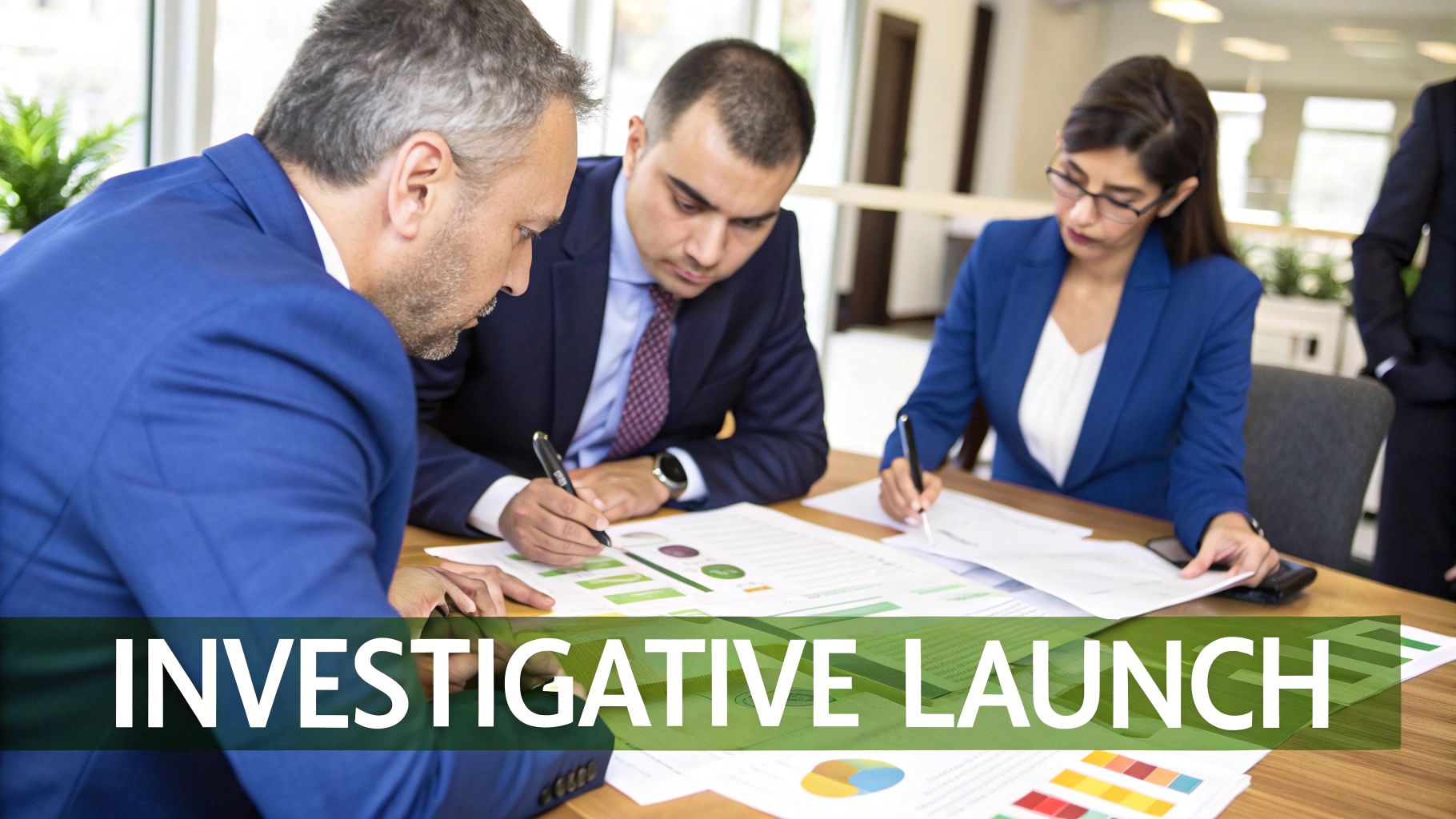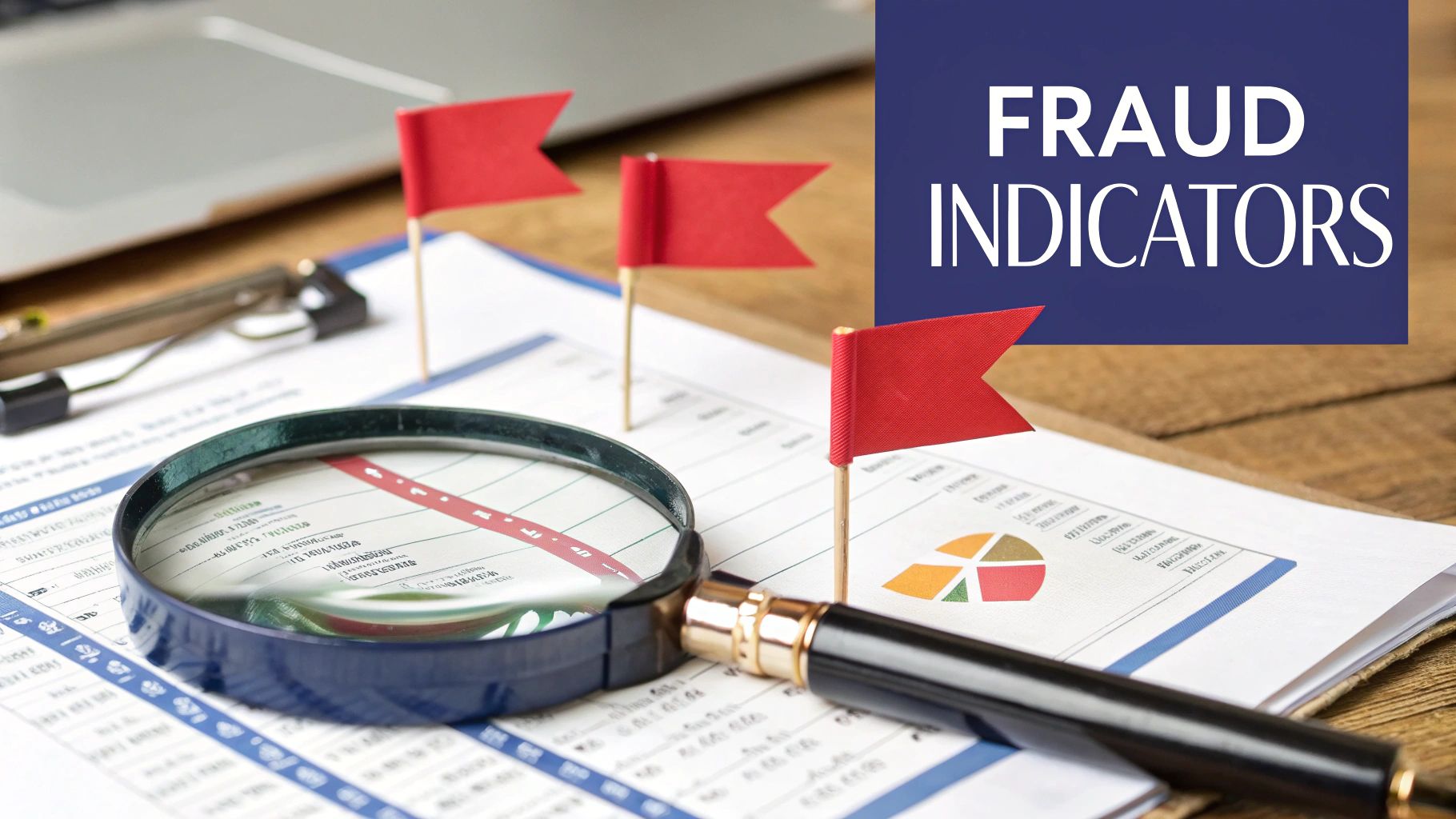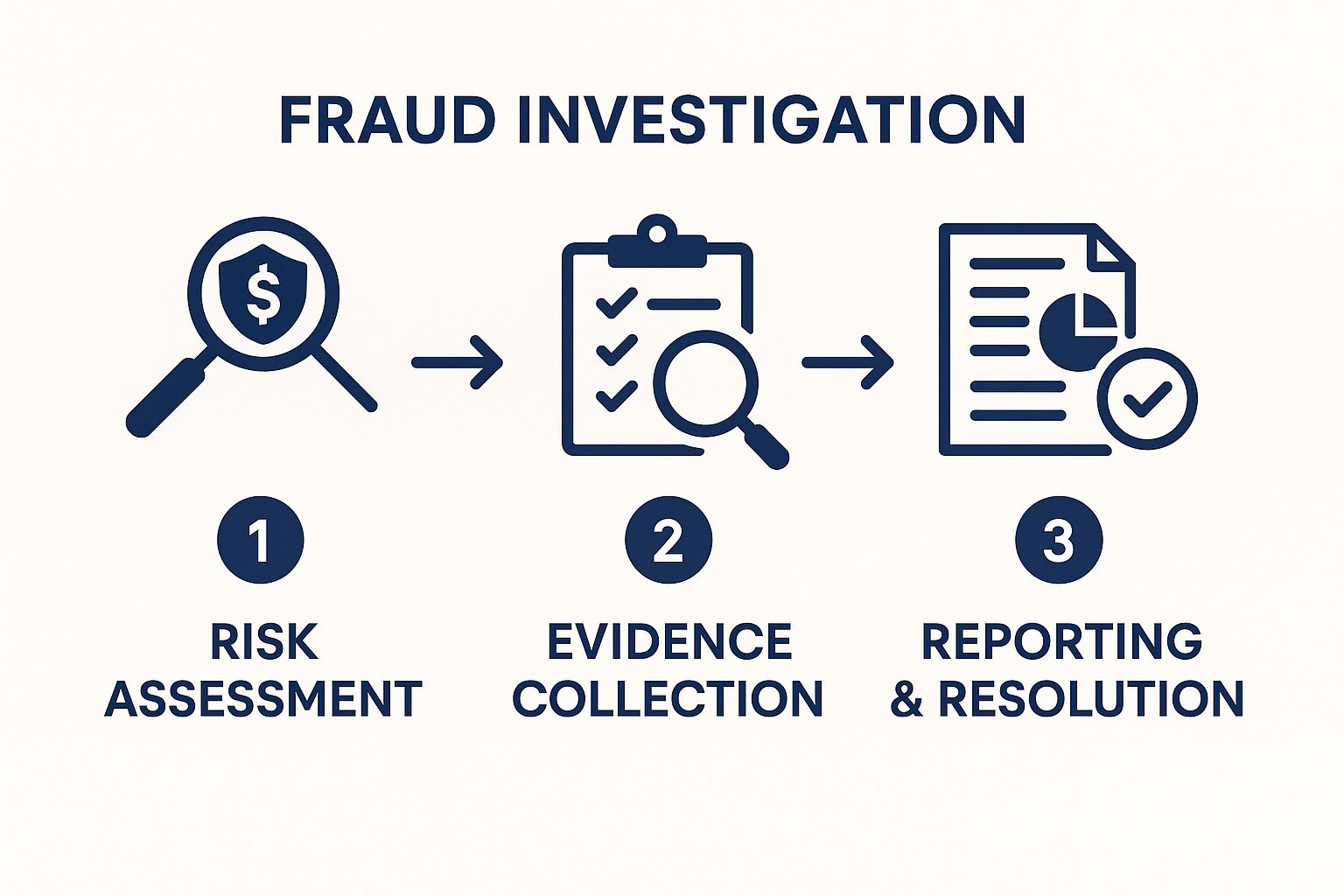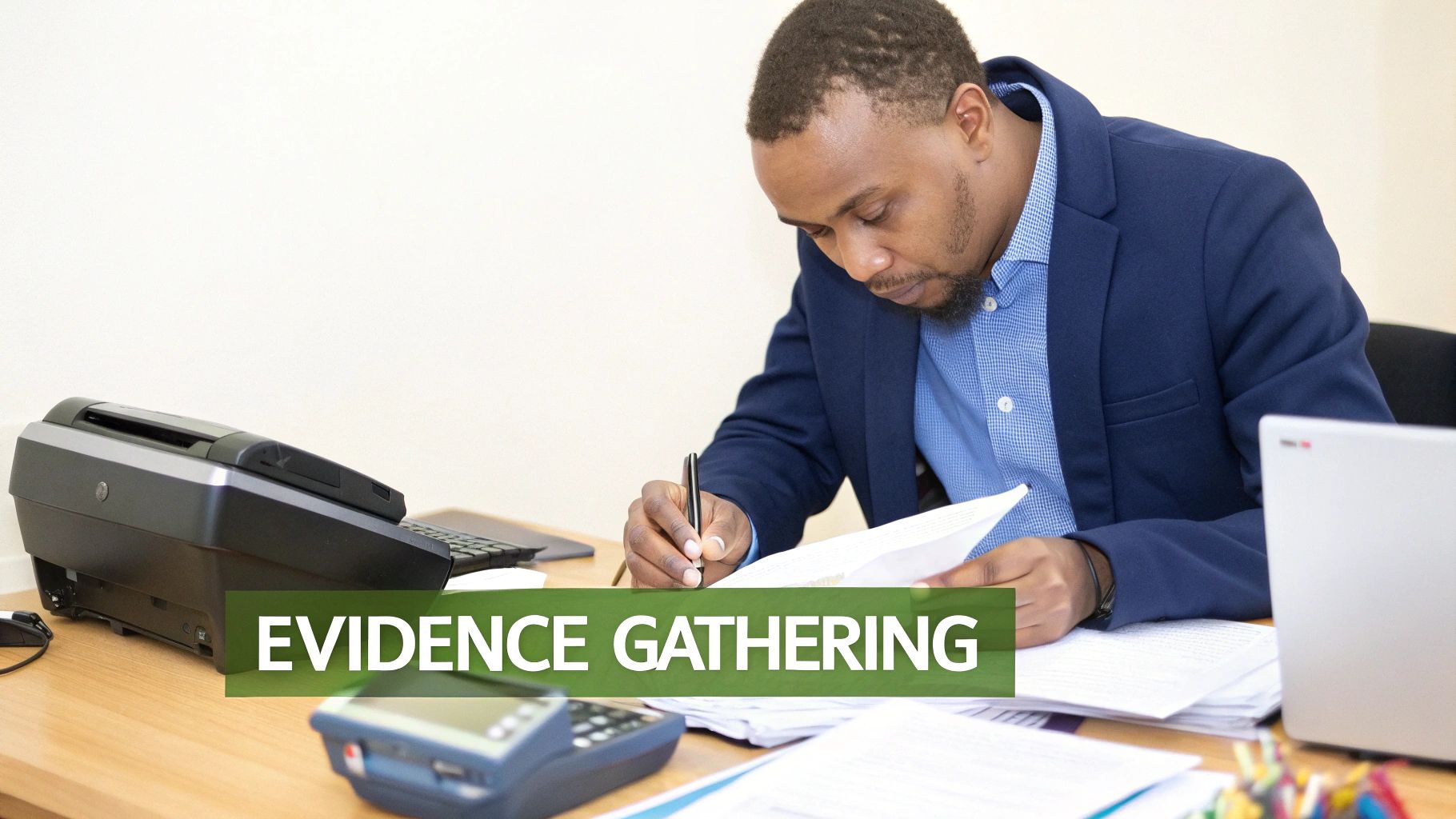A Guide to Corporate Fraud Investigation
- Showix technical Team
- Jul 14, 2025
- 17 min read
Updated: Jul 26, 2025
When you suspect something’s wrong inside your company—perhaps money is missing, or a key employee's behaviour just doesn't add up—you need a structured way to find the truth. That’s what a corporate fraud investigation is all about. It’s a formal process to dig into suspected wrongdoing, whether it’s by an employee, a manager, or even a third-party contractor.
The goal is to gather concrete evidence to answer the big questions: who, what, where, when, and how did the deception happen? Getting this right is crucial. It’s not just about stopping the immediate financial bleed; it's about holding the right people accountable and, most importantly, shoring up your defences to stop it from ever happening again.
What Is Corporate Fraud and Why Does It Matter?

Think of it like this: you discover a trusted partner has been quietly siphoning funds from your business for months. That’s the sting of corporate fraud in a nutshell. It’s a deliberate betrayal of trust, all designed to secure an unfair or unlawful gain. The schemes can range from something as small as fiddling expense claims to something as catastrophic as manipulating the company's financial statements.
But the damage goes far deeper than just the stolen money. Fraud erodes the very foundations of your business—stability, trust, and your hard-earned reputation. That’s why a proper corporate fraud investigation isn't just a fire-fighting exercise. It's a fundamental part of good governance and risk management, helping to protect your assets, your people, and your company's future. The first step to building a solid defence is understanding the different shapes fraud can take.
The Main Types of Corporate Fraud
Fraud schemes can be deceptively simple or mind-bogglingly complex, but they usually fall into one of three main buckets. Knowing which one you’re dealing with helps focus your investigation where it matters most.
Asset Misappropriation: This is by far the most common type. It’s when an employee steals or misuses company resources. It could be as blunt as taking cash from the till or as intricate as creating fake invoices to pay a shell company they secretly control.
Corruption: Here, an employee abuses their position and influence for personal benefit. This often involves working with an outside party. Think of accepting bribes from a supplier for a favourable contract, engaging in conflicts of interest, or getting kickbacks.
Financial Statement Fraud: While it’s the least common, this type of fraud often causes the most financial damage. It’s the deliberate misrepresentation of a company’s financial health to fool investors, lenders, or other stakeholders. High-profile cases, like when U.S. Bank fined for fake customer account violations, show just how serious the consequences can be.
The Real-World Impact of Fraud
The fallout from corporate fraud goes well beyond the balance sheet. In the UK, it’s a massive economic problem, with an estimated £1.2 billion stolen through fraud in 2024 alone. The Crime Survey for England and Wales also highlighted a staggering 19% increase in fraud incidents, bringing the total to nearly 3.9 million cases.
This isn't just a statistic; it's a widespread issue that triggers a domino effect of negative consequences. It leads to immediate financial loss, yes, but it also crushes team morale, shatters customer trust, and can result in severe legal and regulatory penalties. A single incident can tarnish a brand’s reputation for years.
This is precisely why a formal corporate fraud investigation is so vital. It creates a clear, structured path to uncover what really happened, limit the damage, and strengthen the ethical backbone of your business. As our guide explains, https://www.sentryprivateinvestigators.co.uk/post/why-corporate-investigations-are-crucial-for-business-integrity. Without a professional, impartial approach, you risk making a bad situation even worse with a flawed or biased internal review.
How to Spot the Warning Signs of Fraud

Think of fraud like a slow leak in a pipe. It often starts small, maybe just a drip, and goes unnoticed. But if you don't fix it, that small leak can eventually cause catastrophic damage. Catching those early signs is everything.
Instead of waiting for a full-blown crisis, the smartest move is to train your team to spot the warning signs. This makes them your most effective first line of defence. These signs aren't usually flashing neon lights. They’re more subtle—odd patterns in data, shifts in an employee's behaviour, or strange gaps in your company's processes. They're the little clues that whisper something isn't quite right.
Financial Anomalies to Watch For
The numbers rarely lie, which is why financial records are usually the first place evidence of fraud pops up. Even tiny discrepancies can point to a much bigger problem hiding just below the surface.
You don't need to be a forensic accountant to get a sense that something’s off. Keep an eye out for these classic indicators:
Duplicate Payments: Is the same invoice being paid more than once? This could point to a fake vendor scheme or someone simply exploiting an error in the system.
Unusual Invoicing Patterns: A sudden flood of invoices from a new supplier you've never heard of, or invoices missing key details like a phone number or VAT registration, should immediately ring alarm bells.
Ghost Employees: Seeing unfamiliar names on the payroll who don't match any actual team members is a textbook sign of payroll fraud.
Excessive Voids or Write-Offs: If one person is constantly cancelling sales or writing off debts, it could be a way to cover up stolen cash.
This is more important than ever, as criminals are always finding new ways to exploit systems. According to UK Finance, remote purchase fraud surged by 22% as fraudsters targeted newer payment methods. With total losses from unauthorised transactions climbing to £722 million, you simply can't afford to be complacent.
Behavioural and Organisational Red Flags
Fraud isn't just about the numbers; it’s driven by people. The way your employees act and the overall culture of your organisation can be just as telling as any financial report.
A classic example is the employee who never takes a holiday. On the surface, it might look like incredible dedication. In reality, it could be an attempt to stop anyone else from getting a look at their books and uncovering what they've been doing. Other behavioural signs include an employee who suddenly starts living a lavish lifestyle or becomes intensely defensive when you ask simple questions about their work.
A culture where people are afraid to ask questions or get penalised for speaking up is a perfect breeding ground for fraud. When employees feel they can’t report their concerns without facing trouble, misconduct can fester for years.
Recognising these red flags is half the battle. To help you spot them, we've put together a quick reference table.
Common Red Flags of Corporate Fraud
This table summarises some of the key warning signs across different areas of a business. Seeing one of these doesn't automatically mean fraud is happening, but it's a clear signal to start asking questions.
Category | Example Red Flag | What It Could Mean |
|---|---|---|
Financial Records | Invoices consistently paid just under the amount that requires approval. | Someone may be intentionally splitting payments to avoid scrutiny and embezzle funds. |
Employee Behaviour | An employee living well beyond their means (new luxury cars, expensive holidays). | They could have an illicit source of income, potentially from defrauding the company. |
Supplier/Vendor | A supplier's address is a P.O. Box or the same as an employee's home address. | This could be a shell company set up by an employee to create and pay fake invoices. |
Process & Control | One person dominates a key financial process with no oversight or separation of duties. | This creates an opportunity to manipulate records or transactions for personal gain without being caught. |
Company Culture | Management overrides internal controls or pressures staff to ignore standard procedures. | A "tone at the top" that disregards rules can signal a systemic problem or cover-up. |
Keeping an eye out for these financial and behavioural clues is crucial. Understanding the tactics fraudsters use allows you to build a much more resilient defence. We’ve seen these scenarios play out many times, and knowing what to look for is your best advantage. To learn more, check out our guide on the common methods and strategies for uncovering corporate fraud in our detailed article.
Your Step-by-Step Investigation Playbook
When you first suspect fraud, it’s easy to panic. But a disorganised, knee-jerk reaction is the last thing you need. What you really want is a clear, methodical playbook.
Think of a corporate fraud investigation like a complex detective case. It demands a calm, structured approach, not chaos. Following a clear framework helps you move from the first whiff of suspicion to a final, conclusive report, ensuring every action is professional, purposeful, and effective.
This structured path protects the investigation's integrity and gives you the best shot at a successful outcome. It all begins with a careful, initial assessment.

Visualising the process helps you see how each stage builds on the last. From assessing the situation to gathering evidence and writing the report, you’re creating a logical and defensible trail.
Stage 1: Initial Assessment and Planning
Before diving in, you have to get the lay of the land. This first phase is all about gathering preliminary information to understand the nature and potential scale of the problem. Who might be involved? What kind of scheme are you looking at? How bad could the financial or reputational damage be?
Answering these early questions helps you build an investigation plan. This plan needs to outline your objectives, identify who will be on the investigation team (often a mix of legal counsel, HR, and external investigators), and set a realistic budget and timeline. This is also the point where you must act fast to stop the bleeding, like suspending an employee's system access to prevent further losses.
Stage 2: Preserving and Collecting Evidence
Evidence is the heart of any investigation. Without it, you have nothing. This stage is dedicated to systematically gathering every piece of relevant information while meticulously keeping it in its original state. Think of it like a police crime scene—every item has to be handled with extreme care to maintain its value.
Key actions here include:
Securing Digital Evidence: This means creating forensic images of hard drives, seizing work mobile phones, and capturing server data. It’s absolutely critical that no data is changed or deleted, as that could completely undermine the corporate fraud investigation.
Gathering Physical Documents: Pull together all the relevant paperwork—invoices, contracts, expense reports, and personnel files.
Maintaining the Chain of Custody: Every single piece of evidence, digital or physical, needs a documented log. This log shows who handled it, when, and why. This isn't optional; it's essential for the evidence to be usable in any future proceedings.
Stage 3: Conducting Witness Interviews
Once the evidence is secure, it's time to talk to people. Interviews are a delicate art. The goal isn't an aggressive interrogation; it's to gather facts and see if what people say matches the documents and data you've found.
You’ll likely conduct a couple of different types of interviews:
Informational Interviews: These are for witnesses who might have useful information but aren't suspected of any wrongdoing. The tone should be cooperative and focused purely on fact-finding.
Admission-Seeking Interviews: These are reserved for the main person or people at the centre of the investigation. You should only conduct these after you have all your other evidence nailed down. The approach is more direct, presenting the evidence and giving them an opportunity to explain.
Running these interviews properly is a specialised skill. For a much deeper look into the right procedures, our guide on how to conduct fair and effective workplace investigations in the UK provides essential context.
Stage 4: Analysing Data and Reporting Findings
With the evidence collected and interviews done, the final stage is to piece the puzzle together. This involves a deep dive into all the information to spot patterns, confirm the misconduct, and calculate the total loss. Data analytics tools can be a game-changer here, helping you comb through thousands of transactions to pinpoint the fraudulent ones.
The final investigation report is the culmination of all your hard work. It must be a clear, concise, and objective document that sticks to the facts. This is no place for opinions or speculation, only for evidence-based conclusions.
This report should clearly summarise the initial allegation, the steps you took to investigate it, the evidence you uncovered, and what you concluded. It will be the foundation for whatever comes next, whether that's disciplinary action, legal proceedings, or strengthening your internal controls to stop it from happening again.
Navigating the Legal Duties in a UK Fraud Investigation

When you kick off a fraud investigation, you're not just dealing with an internal problem. You're stepping into a complex legal maze governed by UK law. It's a landscape where one misstep can land your company in more trouble than the fraud itself.
Getting a handle on your legal duties isn't just a box-ticking exercise. It's about making sure your investigation is fair, lawful, and ultimately, stands up to scrutiny. These legal guardrails are there for a reason—they protect everyone involved, from the business to the employees being questioned, and they dictate exactly how you should handle evidence, conduct interviews, and report what you find.
A Major Shift in Corporate Responsibility
The ground is shifting under the feet of UK businesses. The days when a company could simply react to fraud after the damage was done are well and truly over. Now, the law expects a proactive, preventative approach from every large organisation.
This change is being driven by the Economic Crime and Corporate Transparency Act, which has brought in a game-changing new offence: the "failure to prevent fraud". This law puts the onus squarely on companies to have "reasonable" fraud prevention measures in place. If an employee commits fraud and you can't show you took the right steps to stop it, the business itself could face criminal charges.
This new legal reality forces companies to get serious about risk assessments and tighten up their fraud prevention procedures. The consequences for getting it wrong are significant. The Financial Conduct Authority (FCA), for example, is already using a more data-driven strategy, zeroing in on cases that will send a clear deterrent message across the industry. You can learn more about how UK law reforms affect corporate crime risk to fully grasp the changes.
This "failure to prevent fraud" offence fundamentally alters the game. It means your internal controls, risk assessments, and anti-fraud policies are no longer just 'best practice'—they are a legal necessity. Ignoring them is a direct invitation for legal trouble.
Balancing the Investigation with Employee Rights
Your primary goal might be to uncover the truth, but you have to do it without trampling on the rights of your employees. A heavy-handed approach is a fast track to an employment tribunal, facing claims of unfair or constructive dismissal that can completely derail your investigation.
Here are the crucial rights you absolutely must respect:
Right to Privacy: Even at work, employees have a reasonable expectation of privacy. Poring over personal emails or searching through someone's belongings without a solid, policy-backed justification is a surefire way to breach data protection laws like GDPR.
Right to a Fair Process: An employee accused of wrongdoing has the right to know what they're being accused of. They must also be given a fair chance to respond to those allegations before you take any disciplinary action.
Right to be Accompanied: In any formal disciplinary meeting, an employee typically has the right to bring a colleague or a trade union representative with them for support.
Riding roughshod over these rights doesn't just open you up to legal action. It poisons the well, making other staff members reluctant to cooperate when they see their colleagues being treated unfairly.
Data Protection and Reporting Duties
Any investigation will mean handling sensitive personal information, and that brings the General Data Protection Regulation (GDPR) into play. GDPR lays down strict rules for how you collect, process, and store this data. You must have a clear and lawful reason for processing any data you touch during the investigation.
Finally, you need to know when it’s time to call in the authorities. While not every instance of internal fraud needs to be reported, some situations absolutely demand it, especially if you're in a regulated industry or the scale of the fraud is substantial.
Deciding whether to report to an organisation like the Serious Fraud Office (SFO) or Action Fraud is a major strategic call. Self-reporting can sometimes result in more lenient treatment, but it also means throwing your doors open to external scrutiny. This is a critical judgement call, and one you should never make without advice from experienced legal counsel.
Right, let's get this rewritten.
When to Call in Professional Fraud Investigators
Deciding whether to handle a suspected fraud internally or bring in external experts is one of the most critical judgement calls a business can make. It’s tempting to think an internal review will be quicker and cheaper, but that path is loaded with potential pitfalls, from unconscious bias to simply not having the right skills for the job. Get this decision wrong, and you could jeopardise the entire investigation.
Thinking you can save a few quid by keeping it all in-house can be a classic false economy. If the situation is complex or, even worse, involves senior figures, an internal team rarely has the impartiality or technical know-how needed. A botched internal investigation can end up destroying evidence, tipping off the culprits, and leaving the company wide open to legal challenges down the line. The real skill is knowing the triggers that mean it's time to bring in the pros.
Clear Triggers for Seeking External Help
Certain situations should be immediate red flags, telling you that your internal team is out of its depth. These aren't just gentle suggestions; they are firm indicators that you need the clear-eyed objectivity and specialised skills that only professional fraud investigators bring to the table.
If you find yourself nodding along to any of the following, it's time to pick up the phone:
Senior Leadership is Implicated: The moment suspicion falls on a director, executive, or senior manager, any internal investigation is compromised. It’s nearly impossible for junior employees to investigate their bosses without fear or favour.
The Case Requires Digital Forensics: Need to recover deleted files, analyse network logs, or trace a digital trail across laptops and servers? This is a highly technical field. One wrong move can make crucial evidence inadmissible in court. You need experts for this.
The Potential Loss is Significant: If the fraud could seriously damage the company’s finances or reputation, the stakes are far too high for an amateur approach. Professionals ensure the investigation is built on a rock-solid foundation that will stand up to scrutiny.
You Suspect Collusion: Trying to unravel a scheme involving multiple employees, maybe even with outside partners, is incredibly complex. Professionals know how to map out these webs of deceit without alerting the very people they're investigating.
The Value of an Independent Perspective
The single biggest advantage external investigators bring is objectivity. They have no internal friendships, no personal biases, and no political axe to grind. Their only job is to follow the evidence and uncover the facts, no matter where they lead.
This impartiality isn’t just about being fair; it's about credibility. An investigation report from a respected third-party firm carries enormous weight with regulators, the police, and the courts. It proves you took the matter seriously and followed a proper, defensible process.
Hiring professionals also means you're tapping into a deep well of experience. They’ve seen countless schemes and know all the tricks fraudsters try to pull. This lets them work efficiently, homing in on the most likely places to find evidence and sidestepping common investigative traps. This is a critical part of any successful corporate fraud investigation.
Internal Review vs External Investigation
Making the right call really depends on the specifics of what you're facing. To help weigh up the options, here’s a straightforward comparison based on the risks and complexity involved.
Consideration | Internal Review | External Investigation |
|---|---|---|
Objectivity | Low. Prone to internal politics, bias, and conflicts of interest. | High. Completely impartial and focused solely on the facts. |
Expertise | Limited to existing employee skills. Lacks specialised forensic and interview training. | High. Access to forensic accountants, digital experts, and skilled interviewers. |
Credibility | Often viewed with scepticism by regulators and legal authorities. | High. Findings are seen as more reliable and defensible. |
Confidentiality | High risk of leaks and gossip, which can alert suspects. | Strong. Bound by professional and contractual duties of confidentiality. |
Best For | Minor policy breaches or simple, low-value misconduct. | Complex fraud, senior-level involvement, or significant financial/reputational risk. |
In the end, calling in professionals isn’t a sign of failure—it’s a sign of strong leadership. It shows you’re committed to getting to the bottom of the issue properly, protecting the business, and making sure the right people are held accountable.
Building a Culture That Prevents Fraud
While reacting to fraud with a full-blown corporate fraud investigation is necessary, the real win is creating an environment where it can't get started. The strongest defence is always a proactive one, building a company culture that naturally repels internal threats.
This isn't about fostering a climate of suspicion. It’s about weaving a thread of integrity through the entire organisation, making transparency and ethical behaviour the default setting. Focusing on prevention does more than just protect your assets; it safeguards your reputation for the long haul. A strong preventative culture is the best investigation you can have—because it’s the one that never needs to happen.
Implementing Robust Internal Controls
The bedrock of a fraud-resistant culture is a solid set of internal controls. Think of them as the locks, bolts, and alarm systems for your company's finances. They are practical, everyday barriers designed to make committing fraud difficult and getting caught much easier. Without them, you’re leaving the door wide open.
One of the most effective controls is the separation of duties. This is a simple but powerful idea: no single person should control a financial transaction from start to finish. For instance, the person who approves invoices shouldn't also be the one who processes the payments. This simple split in responsibility builds in a natural check-and-balance system, dramatically lowering the risk of dodgy payments or fake vendor schemes slipping through.
Setting the Tone from the Top
Rules and procedures are just words on a page unless leadership lives and breathes them. The attitude of senior management sets the ethical compass for everyone else. If leaders are seen cutting corners or treating compliance like a box-ticking exercise, that message trickles down fast.
Leadership can't just talk about ethics; they have to be the living example of the company's code of conduct. This means a non-negotiable commitment to doing things the right way, communicating expectations clearly, and holding everyone accountable—especially those at the top. An ethical tone isn’t just written in a handbook; it's demonstrated in every decision, every day.
When your team sees that leadership is genuinely committed to integrity, it builds trust and makes them want to do the right thing too.
Encouraging a Speak-Up Culture
Even with the best controls in place, you can’t have eyes and ears everywhere. That’s where your employees come in. They are on the front lines and are often the first to spot when something isn’t quite right. That’s why having a safe and easy-to-use whistleblowing programme isn’t just a ‘nice-to-have’—it’s an absolutely essential line of defence.
People need to feel 100% confident that they can flag a concern without any fear of it backfiring on them. This means you need:
Obvious and accessible reporting channels: Give people options, like a confidential helpline, a dedicated email, or an online portal.
A zero-tolerance policy for retaliation: This promise needs to be communicated often and strictly enforced.
A clear follow-up process: When someone raises a concern, they need to know it’s being taken seriously and looked into properly.
When you create a truly safe space for people to speak up, you turn your entire team into guardians of the company’s integrity.
Frequently Asked Questions
When you're facing potential fraud in your business, it’s natural to feel overwhelmed. You’re likely wrestling with a lot of uncertainty. To bring some clarity, we’ve answered a few of the most common questions we hear from business owners and managers.
How Long Does a Corporate Fraud Investigation Take?
There’s no one-size-fits-all answer here. The timeline for a corporate fraud investigation really hinges on how complex the situation is. A straightforward look into a dodgy expense claim might wrap up in a week or so.
On the other hand, a deep dive into a scheme involving multiple people, complex digital trails, and substantial financial losses could easily take several months. The goal is always to be thorough, not just fast. Cutting corners to speed things up often means missing critical evidence, which can create much bigger legal headaches later on.
What Is the First Thing I Should Do If I Suspect Fraud?
The absolute first rule is to act discreetly and avoid alerting the person you suspect. Don't confront them or start a very visible internal review. Tipping them off is the quickest way to ensure evidence gets deleted or destroyed.
Instead, your immediate priorities should be to:
Document your concerns. Write down exactly what you’ve seen and why it strikes you as suspicious. Stick to the facts.
Preserve any evidence you can get your hands on quietly. For example, print out that questionable financial report or save a copy of a suspicious email.
Report it to the right person. This could be your company's compliance officer, in-house legal team, or a trusted senior manager. If the situation feels serious, your very next call should be to a professional investigator.
What Are an Employee's Rights During an Investigation?
In the UK, employees have clear legal rights during any investigation. Respecting these isn't just good practice; it's essential for avoiding legal claims like unfair dismissal down the line.
An employee has the right to be told what they are being accused of. They must also be given a reasonable chance to tell their side of the story before any disciplinary action is taken. They are also entitled to bring a colleague or trade union representative with them to any formal disciplinary meetings.
You also have to consider their privacy. Under GDPR, you can't just trawl through an employee's emails and files without a very good reason. Any data you review must be directly relevant, proportionate to the investigation, and handled according to data protection law. Ignoring these rights can completely undermine your investigation and put your business in serious legal jeopardy.
Navigating a corporate fraud investigation properly demands a specific set of skills, discretion, and a firm grasp of the legal landscape. If you suspect fraud and need professional help, Sentry Private Investigators Ltd offers confidential and thorough investigative services throughout the UK. You can find out more about how we protect businesses like yours at our website: https://www.sentryprivateinvestigators.co.uk.





Comments